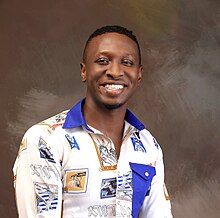Philip Akoda
Philip Akoda | |
|---|---|
 | |
| Born | Philip Akoda 1 May 1996 |
| Nationality | Nigerian |
| Education | BS in Business & Management, University of Derby UK. |
| Alma mater | |
| Occupation(s) | Author, Lexicographer, Entrepreneur |
| Notable work | A 21st Century Efik pocket Dictionary, Efik-English and English-Efik (2022) |
| Title | Founder & CEO of The AFLANG Project |
| Website | theaflangproject |
Philip "Tete" Akoda (Born 1 May 1996) is a Nigerian author, lexicographer and entrepreneur.[1][2] He has written a number of Efik literary works including "A 21st Century Efik pocket Dictionary", "Learn Efik 1-2" and "Groundwork of Eniong Abatim History (1670-2020)".[3] He is also the CEO and Founder of the AFLANG project, an EdTech startup which seeks to preserve and promote African Languages and Culture.[4] Through his startup, he has developed mobile apps such as Learn Efik, which was the first Efik language learning app on google playstore; and later on the first Efik mobile dictionary app which contains over 14,000 words and has been labelled as one of the most comprehensive African dictionary mobile apps.[5][3] Philip is known for his literary contributions to Efik literature.[3]
Biography
[edit]Philip was born in Calabar, Nigeria, in May 1996.[5] He is a great-grandson of Edidem Bassey Eyo Ephraim Adam III.[5] He holds a Bachelor of Science degree (first class honours) in Business and Management from the University of Derby (2024). Before his studies at the University of Derby, Philip had previously attended the University of Essex during this time, he founded the AFLANG project and developed the first Efik Language Learning App.[5] Due to the novel mobile app, Philip was invited to the UK House of Parliament to speak at the Black History Month event.[6]
Literary works
[edit]As an author, Philip has published several literary works which have greatly contributed to Efik literature including Learn Efik 1 and 2 which were his earliest literary works.[1] Due to his knowledge on Efik history, Philip also co-authored Groundwork of Eniong Abatim History (1670-2020) with his mother, Prof Winifred Eyoanwan Akoda. Groundwork of Eniong Abatim History (1670-2020) focuses on the history of Eniong Abatim, an Efik-speaking community in the lower Cross River region of Nigeria.[3] In 2022, Philip published A 21st Century Efik pocket Dictionary: Efik - English, English - Efik.[3] Philip's publications have been adopted in several schools across Calabar, Nigeria.[7][4]
Digital contributions
[edit]Outside the literary space, Philip has championed several digital projects aimed at preserving and promoting African Languages and Cultures.[7] Through his startup, he has published language learning applications for African Languages such as Ndebele, Oromo and Fante.[8][4] One of Philip's most major contributions to the digital space was the Tete Efik Dictionary App.[9] The Tete Efik Dictionary App is an Efik-English/English-Efik mobile dictionary app. Named after Philip whose Efik name is Tete, the app boasts of over 4,000 Efik words and 10,000 English words.[7] It greatly stands out in the digital space due to the intricate details contained in the app some of which include phonemic transcription, definitions, sentence examples, synonyms, antonyms, history & etymology and audio pronunciations.[9] In addition to the Tete Efik Dictionary App, Philip also spearheaded the development of the Yoruba Dictionary App (2024), which contains vast linguistic data such as definitions, phonemic transcriptions, synonyms, antonyms, hypernyms, and hyponyms, along with audio pronunciations from native speakers.[2] The app includes dialectal variations from over 12 Yoruba dialects, making it one of the most comprehensive digital resources for the Yoruba language.[2]
References
[edit]- ^ a b Negroid Haven, 2023
- ^ a b c Vanguard Nigeria, 2024
- ^ a b c d e Akoda, 2023
- ^ a b c Public Presentation of the Book: Groundwork of Eniong Abatim History
- ^ a b c d Role Model Of The Week, 20 Year Old Philip Akoda- Developer Of 1st Efik Language Learning App On Google Play
- ^ Our Youngest Ever Speaker At Our Black History Event, House Of Parliament, 22 Year Old Philip Akoda, Prepared To Take Centre Stage This Friday The 27th
- ^ a b c Andem, 2023
- ^ Chaparadza, 2018
- ^ a b Tete Efik Dictionary
Bibliography
[edit]- "Efik Language and Culture in the Twenty-first Century", Negroid Haven, March 14, 2023, retrieved March 14, 2023
- Akoda, Winifred E. (2022). "From Analogue to Digital: Using Digital Technology to Preserve and Promote Efik Language, Culture and History in the 21st Century" (PDF). Bassey Andah Journal. 15: 38–48. Retrieved August 18, 2023.
- Andem, Ruth (April 1, 2023), "Celebrating the anniversary of the first Efik language mobile dictionary app", Paradise News, archived from the original on 1 April 2023, retrieved April 1, 2023
- "Tete Efik Dictionary App". Retrieved September 13, 2021.
- "Meet Philip Akoda, Nigerian lexicographer championing Yorùbá language preservation through technology". vanguardngr.com. 2024-12-29. Retrieved December 29, 2024.
- ""Learn Efik 1 and 2" by Philip Akoda". Retrieved September 13, 2021.
- "Public Presentation of the Book: Groundwork of Eniong Abatim History", Scribd, Calabar: The Government Printer, 2021
- "Story behind the 1st Efik language learning app on google play, written by 20 year old Philip Akoda from Calabar". Retrieved September 13, 2021.
- "Role Model Of The Week, 20 Year Old Philip Akoda- Developer Of 1st Efik Language Learning App On Google Play". Retrieved September 13, 2021.
- Chaparadza, Alvine. "You Can Easily Learn To Speak And Write In Ndebele With This New App".
- "Our Youngest Ever Speaker At Our Black History Event, House Of Parliament, 22 Year Old Philip Akoda, Prepared To Take Centre Stage This Friday The 27th". Retrieved September 13, 2021.
